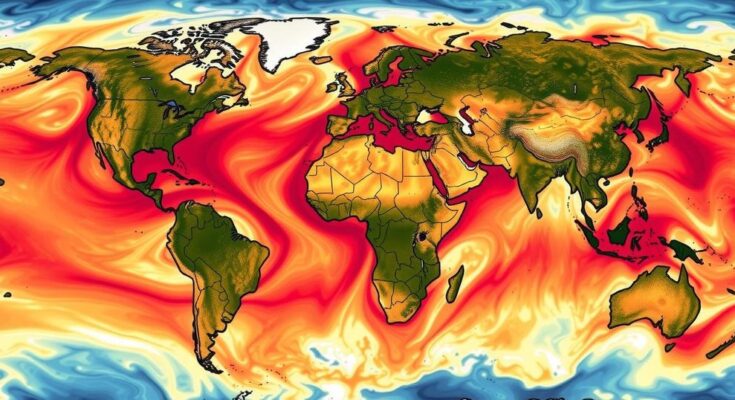Earth recorded its hottest year in 2024, surpassing the dangerous climate threshold of 1.5 degrees Celsius for the first time in history. This unprecedented warming has dire implications, including increased deaths and environmental devastation. The rise in global temperatures, primarily due to greenhouse gas emissions from fossil fuels, raises alarm over the future, with ongoing extreme weather events linked to the crisis.
In 2024, Earth experienced unprecedented heat, registering the highest global average temperature in recorded history. Weather monitoring agencies reported that temperatures exceeded the critical warming limit of 1.5 degrees Celsius, established by the Paris Climate Agreement, for an entire year. This alarming trend was amplified by the previous year’s catastrophic climate events, including 27 billion-dollar weather disasters in the United States, revealing the dire consequences of rising temperatures.
Measurements by various agencies indicated that the global average temperature reached 1.55 degrees Celsius, with some estimates recording even higher figures. The rise in temperatures is attributed primarily to the accumulation of greenhouse gases from fossil fuels. With ongoing warming, the world faces severe implications, including increased mortality rates, environmental degradation, and significant species loss. Additionally, the year concluded with devastating wildfires in California, indicating a troubling escalation in climate-related emergency events.
The scientific community is increasingly alarmed by these developments, with experts underscoring that the 1.5 degrees Celsius threshold is not merely a statistic but a significant warning sign. Surpassing this threshold for a year highlights the urgency of addressing climate change. The dire consequences point to a world where extreme weather patterns become the norm, exacerbating the risk of hazardous events and reinforcing the need for immediate action to mitigate further climatic shifts.
The issue of climate change has gained substantial attention globally, particularly as recent data reveals alarming trends in global temperatures. The Paris Climate Agreement, adopted in 2015, aimed to limit global warming to well below 2 degrees Celsius above pre-industrial levels, with an aspiration to restrict the increase to 1.5 degrees Celsius. Historical climate data has shown a persistent upward trend in temperatures, leading to increased precipitation patterns, more frequent climatic disasters, and significant socio-economic consequences. As the frequency and severity of weather-related disasters rise, understanding the implications of surpassing critical warming thresholds has become increasingly vital.
The record-setting heat of 2024, which surpassed the critical threshold of 1.5 degrees Celsius, serves as a stark reminder of the escalating climate crisis. As greenhouse gas emissions continue to rise, the world faces severe challenges, including extreme weather events, rising sea levels, and loss of biodiversity. The scientific consensus indicates that immediate and coordinated action is essential to mitigate these impacts and work towards sustainable solutions. The need for heightened awareness and proactive measures against climate change has never been more pressing.
Original Source: www.keranews.org




